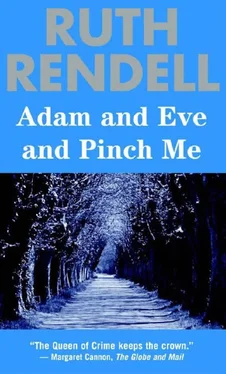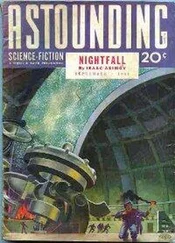Fiona felt physically ill when she read it. There seemed no end to Jeff’s perfidy. How many other women had he wronged? Did the police know? One of them might be guilty of his murder. Throughout the investigation she had never really thought about who might have killed Jeff. She had given the police the names of a few possible enemies but not with much conviction. It didn’t matter to her. If she had considered it at all it was some semi-underworld character that she’d vaguely settled on. Now she thought it might have been one of these women.
But when there was a second death, an old woman murdered by the same means, she revised her view. The perpetrator must be someone who knew both victims. And who fitted that description better than a woman from his past? Who better than herself? She phoned Violent Crimes as soon as she thought of this and before they had a chance to fasten on to her. But she didn’t mention Linda Davies.
By now the police had dismissed the idea of Kieran Goodall and Dillon Bennett as Eileen Dring’s killers. But they were useful witnesses. If their fantasies of how they disposed of the knife had varied and changed from hour to hour, their separate stories of the time they arrived at the murder site and what they saw when they got there tallied in every detail. They had arrived on the scene at one-thirty on Sunday morning, a fact both knew because Dillon was wearing his new watch. This watch was another cause of speculation, dismissed for the time being on the grounds of there being more important things to attend to. It was stolen, that went without saying, though Dillon’s stepmother swore she’d given it to him for his birthday the previous month. Wherever it came from, it showed exactly one-thirty. Both boys had looked at it. Watching videos had taught them the significance of noting the time at crime scenes, for they knew this was a crime, though they weren’t frightened. Another interesting-and appalling-factor was that neither saw anything out of the way in being out in the streets in the middle of the night. Nocturnal wanderings were what they did. They slept half the day and mostly missed school.
Kieran and Dillon had lifted Eileen Dring’s head, remarking that it had felt warm to the touch and not stiff, pulled out the bag, emptied it onto the pavement, and helped themselves to its contents. The money was an unexpected windfall. They took everything but Eileen’s cardigan for which they had no use, and carried off their haul to the abandoned shop where they had a sanctuary they called their camp. If they’d seen anyone on the streets in those small hours they hadn’t noticed or weren’t telling. The police were done with them. It was now a case for the Social Services.
The two police officers sat in Fiona’s living room, listening to the history of her encounters with Eileen Dring through the years. Too late, Fiona understood what she’d done in volunteering information that might have remained undiscovered. Gradually it seemed to dawn on these two officers that here was a prime suspect, a woman who’d been living with one victim and been friend and benefactor to the other.
“You mean she sometimes slept in your garden?”
“No, but I offered her the use of my shed. Only I felt awful about it. I thought I should have said to come inside and sleep in the house and I said that to her. But she told me she’d got a room of her own if that was what she wanted. Sleeping indoors didn’t suit her and she wouldn’t have my shed either.”
“Why did you make these offers, Miss Harrington?”
“I suppose I was sorry for her.”
“Did you ever give her money?”
“She wasn’t a beggar.”
“Maybe not, but did she ever try to get money from you?”
Were they implying Eileen had blackmailed her? Fiona felt herself trapped in a snare of her own devising. She remembered various occasions of quixotry, a handful of change here, a five-pound note there, and Jeff’s indignation.
“Jeff told me not to give her anything, but I did sometimes. I tried not to do it near here. I’d give her money if I came upon her somewhere else-near a flower shop, I mean. She told me a lot about herself. Her children had died in a fire. They got her out but hadn’t been able to save the children. That turned her brain, I think. She’d been strange ever since.”
She could tell by their faces that these facts were already known to them. They asked her if she could account for her movements on Saturday night but she could only say she’d been in bed asleep. With Jeff’s death, she said, staying up late, going out in the evenings, had come to an end for her. They told her to phone the bank and say she wouldn’t be in, and they asked her to accompany them to the police station. She was too horrified to argue, too aghast even to ask for an explanation. There she sat on a hard chair in an interview room for several hours, answering a string of questions but turning over in her mind how she could prove she’d been at home on Saturday night.
Then the answer-or an answer-came to her. She hadn’t slept well. She never had since Jeff died and her dependency on sleeping pills troubled her. Night after night she tried to sleep without taking one and almost always she succumbed. So it had been on Saturday. Sometime after midnight, nearly an hour after, she thought, she had got up and gone to the window, hearing as she crossed the floor a door closed in the house next door. That was all you ever heard, the shutting of a door or a light being turned on or off. And when she drew back a curtain she saw the light from Michelle’s and Matthew’s bedroom window go out. It had shed a bright rectangle onto their front lawn, a light that was abruptly withdrawn, she told Violent Crimes.
And she saw at once that they doubted her. “We’ll see if we can get some other neighbor to corroborate that.” It would let you and those Jarveys off the hook, she could tell they were thinking. She clasped her hands together, almost praying. If she could undo the harm she’d done to Michelle and Matthew she’d be as happy as if she’d exonerated herself.
Calling next door when they’d let her go brought fresh unjustified guilt. She felt the police must be watching her. Who, for instance, was that boy on the other side of the street? He looked no more than eighteen but he was probably twenty-five. He was sitting on a garden wall, apparently reading the Standard . Fiona thought he could be a policeman who had been sent to follow her home and see what she did. She was looking over her shoulder at him when Michelle opened the door. He’d think she and the Jarveys were in some sort of conspiracy together.
When Michelle heard Fiona’s story of her day, she couldn’t help feeling a flash of exultation that her neighbor, who had brought all this trouble on Matthew and her, was now in the same jeopardy as themselves. And even as she thought this she reproached herself for her mean-spiritedness. It was such a far cry from the way she’d felt about Fiona a month ago. Michelle took Fiona’s hand and kissed her cheek to make things better but still they weren’t better. Matthew opened a bottle of wine and Fiona drank hers greedily.
“I’m sure he’s a policeman on surveillance.”
Michelle went to the window, noticing as she did so how easy it was now for her to get up out of soft cushions and how lightly she walked. “It’s not a policeman,” she said. “He’s the nephew of the woman who lives there. He hasn’t a key and he’s waiting for her to come home.”
“You don’t think I’d have harmed Jeff or Eileen, do you?”
Michelle didn’t answer. It was Matthew, always brave and always one to speak his mind, who said, “You thought we had.”
Fiona said nothing. She walked to the window, stood by Michelle, and gazed out into the street. Suddenly she wheeled round and said, “I’ve had a begging letter. From a woman Jeff-got money out of.” Michelle laid a hand softly on her shoulder. “Oh, I know what he was. I’ve learned a lot since he died. She wants a thousand pounds.”
Читать дальше











